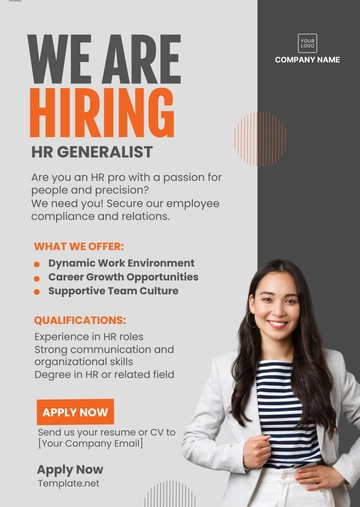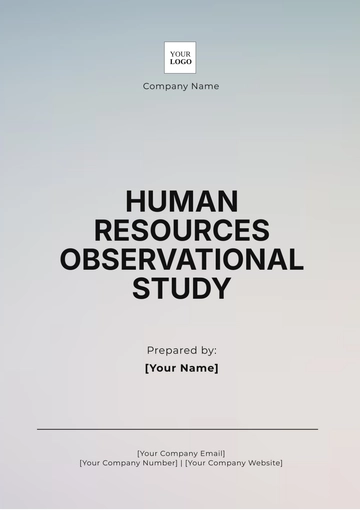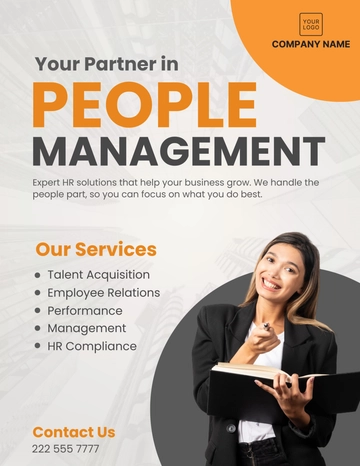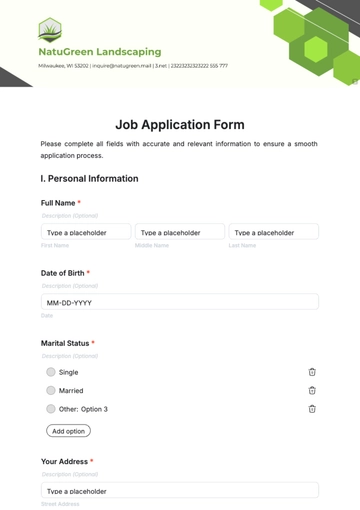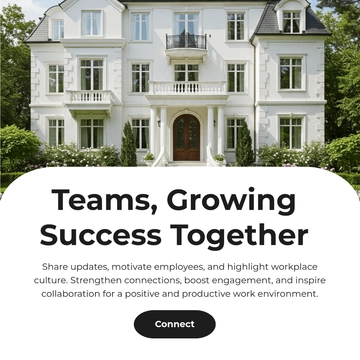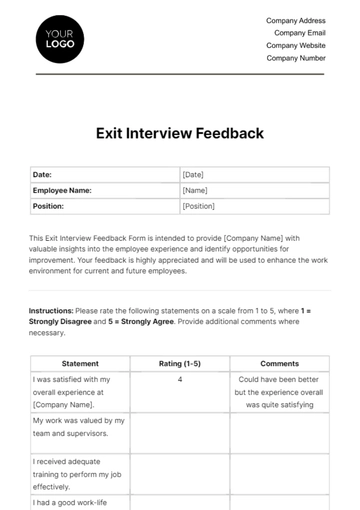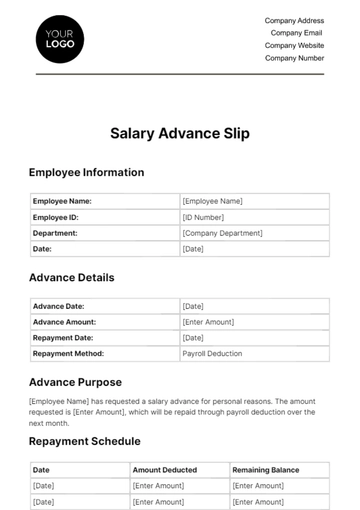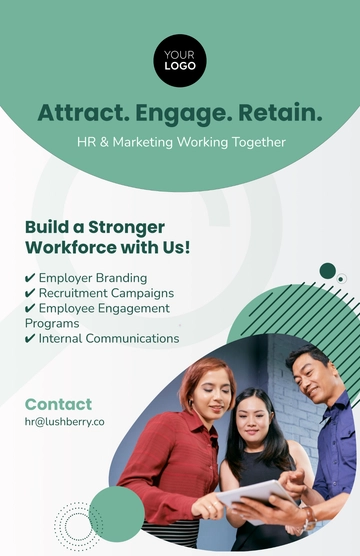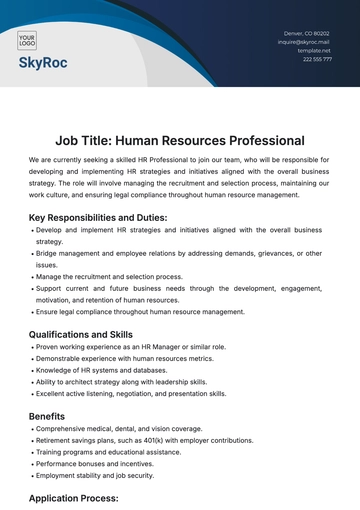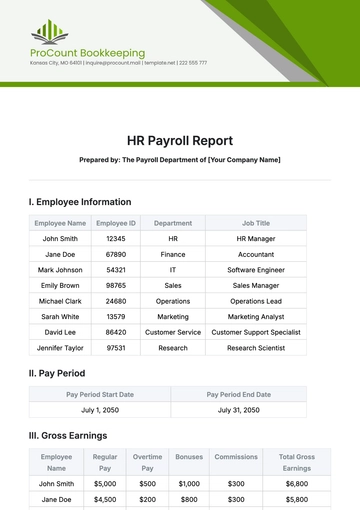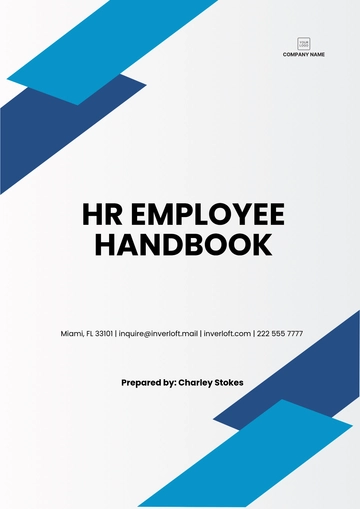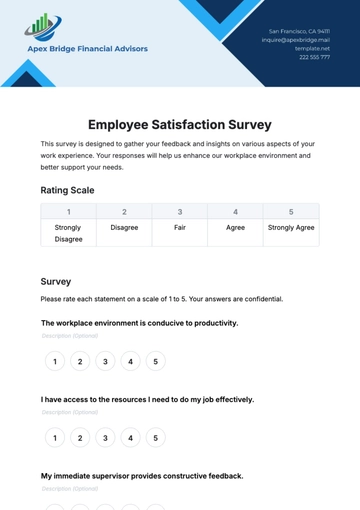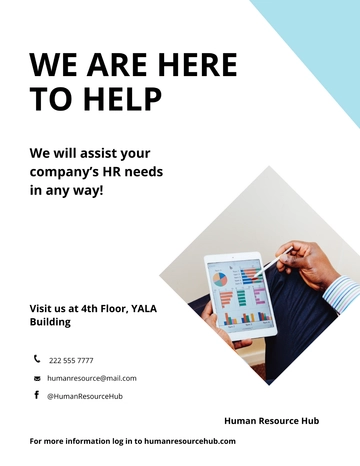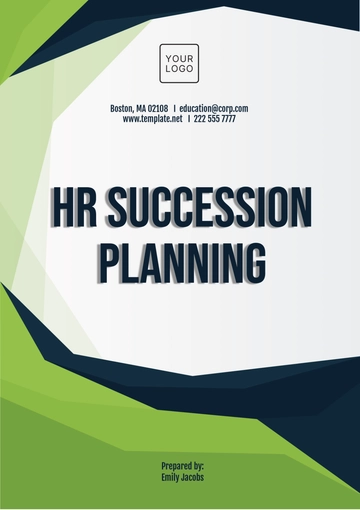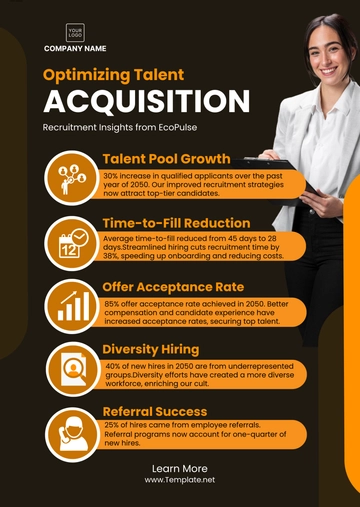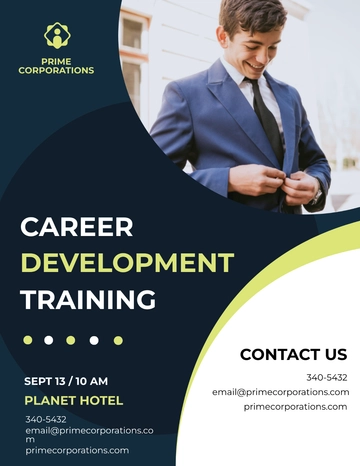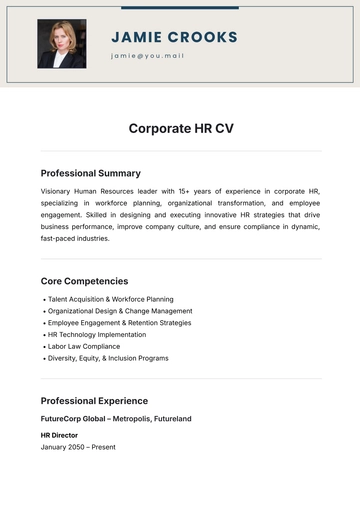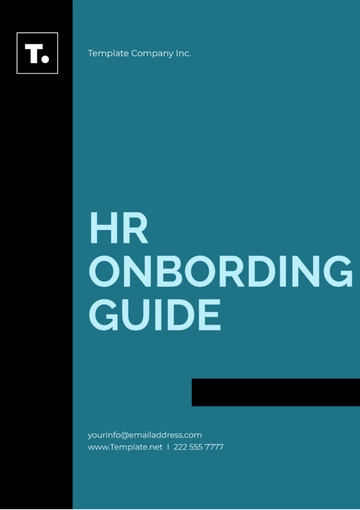Free Comprehensive Guide to Relationship-focused Training HR
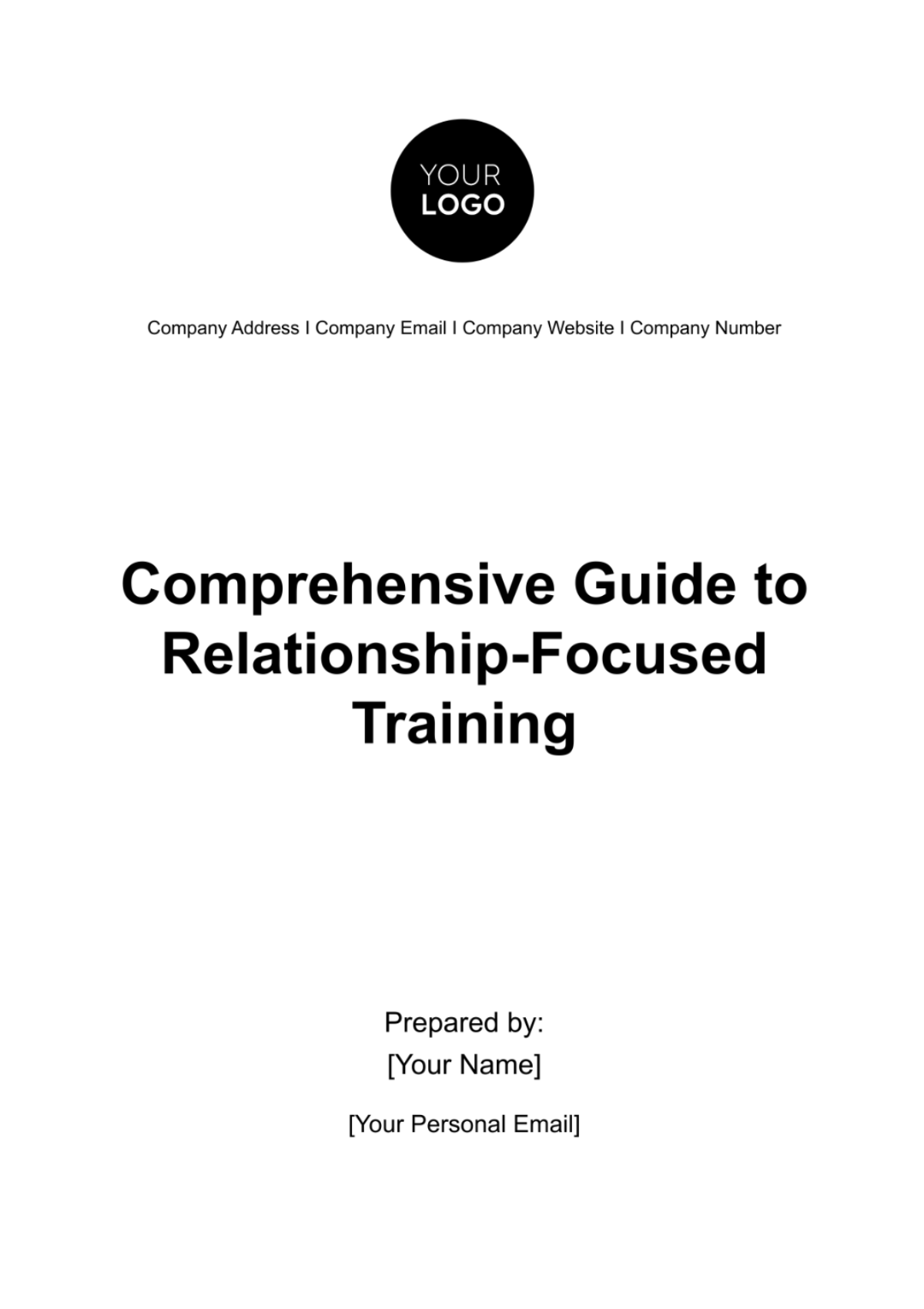
Relationship-Focused Training
TABLE OF CONTENTS
1. Introduction ...................................................................................................................3
1.1 Importance of Relationship-Focused Training in Marketing ..........................................3
1.2 Objectives of This Guide .............................................................................................3
2. Understanding Relationship-Focused Training .............................................................3
2.1 Definition and Concept ................................................................................................4
2.2 Benefits for Marketing Agencies .................................................................................4
2.3 Key Principles .............................................................................................................4
3. Preparing for Relationship-Focused Training ................................................................5
3.1 Assessing Current Skill Levels .....................................................................................5
3.2 Setting Clear Training Goals .......................................................................................6
4. Designing Customized Training Programs .....................................................................7
4.1 Identifying Training Needs ...........................................................................................7
5. Selecting the Right Training Resources .........................................................................7
5.1 In-House Expertise: .....................................................................................................8
5.2 External Trainers: ........................................................................................................8
6. Effective Relationship-Focused Training Techniques ....................................................8
6.1.Role-Playing: ................................................................................................................8
6.2. Simulations: ...............................................................................................................9
7. Monitoring and Assessing Progress ..............................................................................9
7.1. Defining Key Performance Indicators (KPIs) ................................................................9
7.1.1 Client Satisfaction Rating ...........................................................................................9
7.1.2 Client Retention Rates: ..............................................................................................9
7.1.3 Cross-Selling and Upselling: .....................................................................................9
7.1.4 Communication Metrics: ...........................................................................................9
8. Conclusion ....................................................................................................................9
8.1 Importance of Relationship-Focused Training: ...........................................................10
8.2 Understanding Relationship-Focused Training: .........................................................10
8.3 Preparing for Relationship-Focused Training: ............................................................10
1. Introduction
In the fast-evolving landscape of marketing, success is not solely determined by the quality of your products or services; it also depends on the strength of the relationships you build. Relationship-focused training has emerged as a pivotal strategy for marketing agencies seeking to thrive in this competitive environment. This comprehensive guide is your roadmap to understanding, implementing, and excelling in relationship-focused training within your marketing agency.
1.1 Importance of Relationship-Focused Training in Marketing
Client-Centric Approach: In an era where clients demand not just solutions but also meaningful connections, relationship-focused training becomes a strategic imperative. It equips your team with the interpersonal skills and client-centric mindset required to forge enduring bonds with clients.
Enhanced Communication: Effective communication is the bedrock of any successful marketing campaign. Training in this area empowers your team to articulate ideas, listen actively, and negotiate with finesse.
Client Retention: Satisfied clients are more likely to stay loyal to your agency, reducing the churn rate and creating a stable revenue stream. Relationship-focused training is instrumental in boosting client satisfaction and, consequently, retention.
Competitive Edge: In a crowded marketplace, a reputation for stellar client relationships can be a game-changer. Agencies that excel in this aspect gain a competitive edge, attracting new clients and retaining existing ones.
1.2 Objectives of This Guide
Provide Clarity: We aim to provide marketing agencies with a clear and comprehensive understanding of what relationship-focused training entails, why it is essential, and how it can be implemented effectively.
Actionable Insights: We offer practical, actionable insights and strategies that can be readily applied within your agency to enhance relationship-building skills and overall performance.
Real-World Examples: By showcasing real-life case studies and best practices, we aim to inspire and guide you through the successful implementation of relationship-focused training programs.
Ethical Considerations: In an era where ethical considerations are paramount, we explore the ethical dimensions of relationship-focused training, emphasizing privacy, diversity, and avoiding manipulative practices.
Understanding Relationship-Focused Training
In this section, we delve deeper into the concept of Relationship-Focused Training for marketing agencies. We'll define and explore its core concept, elucidate the benefits it offers to marketing agencies, and discuss the key principles that underpin successful relationship-focused training programs.
2.1 Definition and Concept
Relationship-focused training, also known as client-centric training or interpersonal skills training, is a systematic approach aimed at equipping marketing professionals with the skills, knowledge, and attitudes necessary to initiate, develop, and sustain strong and meaningful relationships within the marketing context. It extends beyond traditional skill development to encompass the cultivation of trust, empathy, and communication prowess essential for successful client interactions.
At its core, relationship-focused training recognizes that marketing is fundamentally about people. The concept revolves around the idea that businesses succeed when they genuinely understand and cater to the needs, desires, and pain points of their clients and partners. It encompasses a comprehensive set of skills and strategies to foster trust, empathy, and effective communication, thereby strengthening relationships with clients, colleagues, and stakeholders.
2.2 Benefits for Marketing Agencies
Improved Client Retention: Relationship-focused training contributes significantly to client satisfaction and loyalty. Clients who feel heard and valued are more likely to stay with an agency for the long term.
Enhanced Cross-Functional Collaboration: Effective training fosters better collaboration not only within the marketing team but also with other departments like sales, product development, and customer support. This leads to more holistic and successful marketing campaigns.
Increased Sales and Revenue: The ability to build relationships translates to upselling and cross-selling opportunities. Professionals trained in relationship-building often identify and seize revenue-generating possibilities.
Reputation and Brand Building: Positive client relationships enhance an agency's reputation and brand equity. Satisfied clients are more likely to refer new business, contributing to organic growth.
Employee Satisfaction: Marketing professionals who receive relationship-focused training report increased job satisfaction. They feel more confident in their roles, knowing they can navigate challenging client interactions effectively.
Competitive Advantage: Agencies with a well-trained team dedicated to relationship-building gain a significant competitive advantage. They stand out in a crowded market and can secure high-value clients.
2.3 Key Principles
Successful relationship-focused training is built upon several key principles:
Personalization: Training programs should be tailored to the unique needs and challenges of the agency. A one-size-fits-all approach may not effectively address specific issues.
Continuous Learning: The marketing industry is dynamic, and effective training should be an ongoing process. Professionals must continuously develop and adapt their skills to stay relevant.
Ethical Considerations: Relationship-focused training should always emphasize ethical behavior in client interactions. It is crucial to prioritize transparency, honesty, and respect.
Measurement and Assessment: Training effectiveness should be regularly assessed through key performance indicators (KPIs) and feedback mechanisms. This ensures that training aligns with agency goals and results in tangible improvements.
Cultural Alignment: The principles and values promoted in relationship-focused training should align with the agency's culture and mission. A cohesive approach fosters consistency in client interactions.
3. Preparing for Relationship-Focused Training
Before embarking on the journey of relationship-focused training, marketing agencies must take strategic steps to ensure the effectiveness and alignment of their training initiatives. This section explores two crucial aspects of this preparation phase: assessing the current skill levels of your team and setting clear training goals.
3.1 Assessing Current Skill Levels
Skills Inventory: Begin by conducting a comprehensive skills inventory within your marketing agency. Identify the specific skills and competencies that are critical for building and maintaining strong relationships in your industry.
Self-Assessment: Encourage employees to self-assess their interpersonal and relationship-building skills. This self-awareness can serve as a starting point for improvement.
Peer and Supervisor Feedback: Solicit feedback from peers and supervisors. They can provide valuable insights into team members' strengths and areas for improvement.
Client Feedback: Collect and analyze client feedback. Assess client satisfaction, communication effectiveness, and the overall quality of relationships with your agency.
Assessment Tools: Consider using assessment tools, such as 360-degree feedback surveys or standardized assessments, to gain a more objective understanding of skill levels.
Benchmarking: Compare your agency's skill levels with industry benchmarks to identify where you stand in relation to competitors and industry standards.
Gap Analysis: After gathering data, perform a gap analysis to determine the disparity between current skill levels and the skills required for effective relationship-building in your specific context.
Identify Training Needs: Based on the gap analysis, identify the specific areas where training is needed. Prioritize these areas to focus your training efforts effectively.
3.2 Setting Clear Training Goals
Align with Business Objectives: Ensure that your training goals are aligned with your agency's broader business objectives. Relationship-focused training should contribute to achieving these objectives.
Specific and Measurable Goals: Make your training goals specific and measurable. Instead of a vague goal like "improve client relationships," set a goal like "increase client satisfaction ratings by 20% within the next year."
Time-Bound Goals: Assign timelines to your training goals. Setting deadlines creates a sense of urgency and helps track progress.
Realistic and Achievable: Ensure that your training goals are realistic and attainable within the given resources and timeframes. Unrealistic goals can lead to frustration and demotivation.
Relevant to Roles: Tailor training goals to the roles and responsibilities of your employees. What's relevant for client-facing roles may differ from what's relevant for those in backend operations.
Feedback and Input: Involve employees in the goal-setting process. Seek their input and feedback to ensure that goals are perceived as meaningful and achievable.
Quantitative and Qualitative Goals: Consider both quantitative metrics (e.g., increase in client retention rate) and qualitative metrics (e.g., improved client feedback) to capture the holistic impact of relationship-focused training.
Communication and Transparency: Clearly communicate training goals to all employees. Transparency fosters buy-in and commitment to achieving these goals.
Regular Review: Establish a system for regularly reviewing and updating training goals as circumstances evolve. Flexibility is essential in a dynamic industry like marketing.
By thoroughly assessing current skill levels and setting clear, strategic training goals, marketing agencies lay the foundation for a successful relationship-focused training program. These preparatory steps ensure that training efforts are targeted, relevant, and aligned with the agency's overarching business objectives. The next steps involve designing customized training programs tailored to address identified skill gaps and selecting the right training resources to support these initiatives.
4. Designing Customized Training Programs
The success of relationship-focused training hinges on the ability to design programs that address the specific needs and challenges of your marketing agency. In this section, we explore the crucial steps of identifying training needs and creating a tailored curriculum.
4.1 Identifying Training Needs
Data Analysis: Review the data collected during the assessment of current skill levels. Identify trends and patterns in the data to pinpoint the most pressing training needs.
Stakeholder Input: Gather input from various stakeholders, including employees, managers, and clients. Their perspectives can provide valuable insights into areas that require improvement.
SWOT Analysis: Conduct a SWOT (Strengths, Weaknesses, Opportunities, Threats) analysis to assess both internal and external factors influencing your agency's relationship-building capabilities.
Client Feedback: Pay particular attention to client feedback and complaints. Identify recurring issues or concerns raised by clients that may indicate skill gaps.
Industry Trends: Stay informed about industry trends and changes. The evolving nature of marketing may necessitate new skills and knowledge for building relationships effectively.
Competitor Analysis: Analyze the practices of your competitors. Identify aspects of their client interactions that seem particularly effective or areas where they excel in relationship-building.
Benchmarking: Compare your agency's skill levels and client satisfaction metrics with industry benchmarks to understand where you stand relative to industry standards.
Custom Surveys and Assessments: Develop custom surveys or assessments tailored to your agency's unique needs. These can help gather specific data on areas of concern.
5. Selecting the Right Training Resources
Selecting the appropriate training resources is critical to the success of your relationship-focused training program. In this section, we'll explore two key considerations: whether to rely on in-house expertise or external trainers and the selection of suitable training materials and tools.
5.1 In-House Expertise:
Pros:
Familiarity with the agency's culture and specific challenges.
Knowledge of the agency's clients, processes, and industry nuances.
Cost-effective, as it utilizes existing talent.
Ability to provide ongoing training and mentorship.
Cons:
Limited perspective and potential biases.
May lack expertise in certain training areas.
May have time constraints due to existing roles and responsibilities.
5.2 External Trainers:
Pros:
Expertise in specialized training areas.
Fresh perspectives and diverse experiences.
Objective evaluation of the agency's training needs.
Can bring industry best practices.
Cons:
May be less familiar with the agency's unique challenges.
Higher costs associated with external trainers.
Potential difficulty in maintaining ongoing training.
6. Effective Relationship-Focused Training Techniques
To impart relationship-focused skills effectively, marketing agencies must employ engaging and interactive training techniques. This section explores two powerful methods: role-playing and simulations, as well as case studies and real-life scenarios.
6.1.Role-Playing:
Pros:
Provides hands-on practice in a controlled environment.
Helps participants develop communication and problem-solving skills.
Builds empathy by allowing participants to step into different roles.
Cons:
May be intimidating for some participants initially.
Requires skilled facilitators to provide constructive feedback.
Artificial scenarios may not fully replicate real-world challenges.
6.2. Simulations:
Pros:
Creates a virtual environment to simulate real-world scenarios.
Allows participants to make decisions and see the consequences.
Suitable for complex client interactions and crisis management.
Cons:
Can be resource-intensive to develop.
May require specialized software or technology.
Participants might disengage if simulations are too lengthy or complicated.
7. Monitoring and Assessing Progress
To ensure the effectiveness of your relationship-focused training program, ongoing monitoring and assessment are essential. This section discusses two crucial aspects of this process: defining Key Performance Indicators (KPIs) and conducting regular progress check-ins.
7.1. Defining Key Performance Indicators (KPIs)
7.1.1 Client Satisfaction Rating
KPI: Measure changes in client satisfaction scores before and after training.
Importance: An increase in client satisfaction indicates improved relationship-building skills and overall client happiness.
7.1.2 Client Retention Rates:
KPI: Track the percentage of clients who continue to engage with your agency over time.
Importance: Higher retention rates demonstrate the agency's ability to maintain long-term relationships.
7.1.3 Cross-Selling and Upselling:
KPI: Measure the success of cross-selling or upselling efforts post-training.
Importance: Improved relationship-building skills often result in more opportunities for additional sales.
7.1.4 Communication Metrics:
KPI: Track communication metrics such as response times, quality of client communication, and frequency of client interactions.
Importance: These metrics reflect the effectiveness of communication skills learned in training.
8. Conclusion
In the fast-paced world of marketing, where relationships are pivotal, relationship-focused training has emerged as an indispensable asset for marketing agencies striving to excel in client interactions, team collaborations, and overall success. This comprehensive guide has provided a deep dive into the various facets of relationship-focused training, from its definition and importance to its design, implementation, and assessment.
8.1 Importance of Relationship-Focused Training:
Understanding that relationships lie at the heart of marketing success.
Recognizing the competitive advantage, trust, loyalty, and adaptability it offers marketing agencies.
8.2 Understanding Relationship-Focused Training:
Defining its concept and principles.
Recognizing its benefits for marketing agencies, including client retention, revenue generation, and competitive edge.
8.3 Preparing for Relationship-Focused Training:
Assessing current skill levels.
Setting clear training goals that align with business objectives.
- 100% Customizable, free editor
- Access 1 Million+ Templates, photo’s & graphics
- Download or share as a template
- Click and replace photos, graphics, text, backgrounds
- Resize, crop, AI write & more
- Access advanced editor
Discover a transformative HR resource with the Comprehensive Guide to Relationship-focused Training HR Template on Template.net. This editable and customizable template is designed for seamless integration into your HR strategy. Crafted with precision, it's editable in our Ai Editor Tool, ensuring effortless customization for tailored relationship-centric training programs. Elevate your HR approach today!
